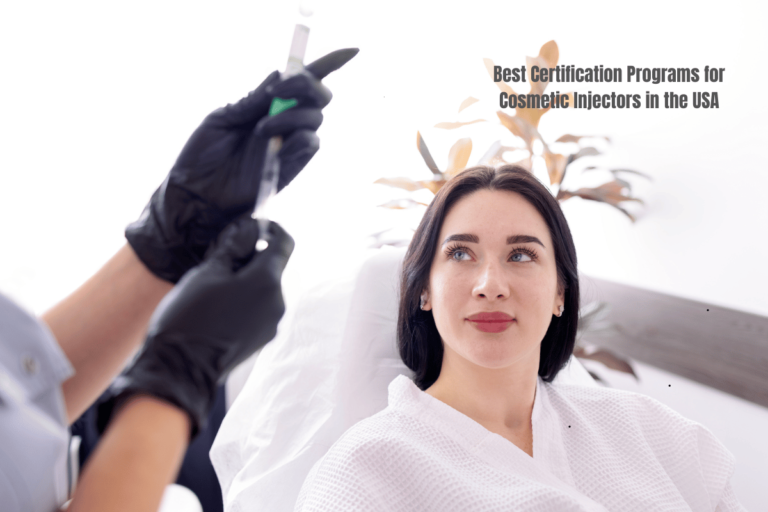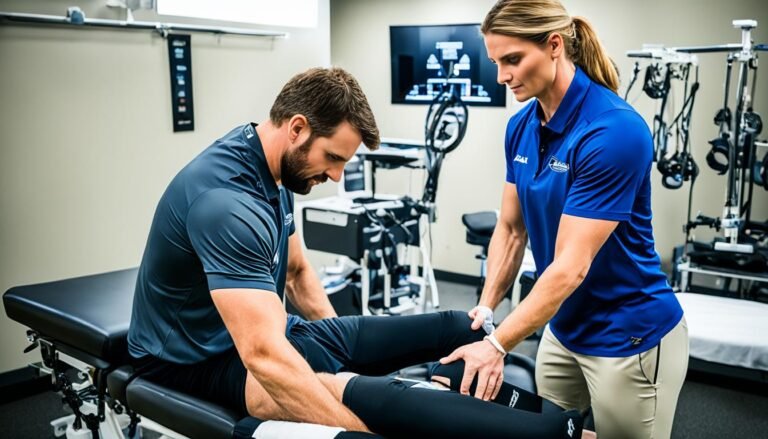A Guide to Master’s Programs in Healthcare Ethics
The field of healthcare ethics needs more experts. Its demand is growing fast. As medical technology becomes more advanced, ethical dilemmas also increase. This means that we need more trained healthcare ethics specialists.
Master’s programs in healthcare ethics teach essential skills. They help students face ethical issues in the healthcare industry. These programs offer valuable knowledge for a meaningful career.
Key Takeaways:
- Master’s programs in healthcare ethics give students in-depth knowledge and skills for ethical challenges in healthcare.
- The need for healthcare ethics experts is rising because of complex medical advancements and ethical issues.
- These programs open doors to careers in healthcare, law, research, public health, and more.
- Institutions like the Johns Hopkins Berman Institute of Bioethics and Ohio State University are known for their healthcare ethics master’s programs.
- Graduates from these programs are vital in ensuring ethical practices in healthcare and research.
The Johns Hopkins Berman Institute of Bioethics
The Master of Bioethics (MBE) degree from the Johns Hopkins Berman Institute is unique. It brings together knowledge from science, humanities, arts, public health, and medicine. This mix of disciplines helps students face various bioethics issues. It prepares them for a future where they can make a real difference in their communities.
Students in the MBE Program at Johns Hopkins enjoy many scholarships. These scholarships can cover up to 20% of the tuition, making the program more affordable. The Institute also awards scholarships for outstanding students. These help reduce the cost of studying bioethics even further.
Testimonial from a Berman Institute MBE Program Graduate
“The Master of Bioethics program at Johns Hopkins Berman Institute really broadened my understanding of bioethics. It gave me the skills to handle tough ethical issues in healthcare. I got to see things from many angles and think critically. Thanks to the Institute’s scholarships, I could follow my bioethics passion. I believe anyone wanting to boost their bioethics skills should consider this program. It’s been a great experience for me. “
Scholarships at the Johns Hopkins Berman Institute of Bioethics
| Scholarship Name | Eligibility | Amount |
|---|---|---|
| Berman Institute Merit Scholarship | Based on academic merit and promise in bioethics | Varies |
| Berman Institute Diversity Scholarship | Students from diverse backgrounds | Up to 20% of tuition cost |
| Berman Institute Leadership Scholarship | Students with exceptional leadership qualities | Varies |
Ohio State University Master of Arts in Bioethics
The Master of Arts in Bioethics at Ohio State University covers many areas. It’s perfect for healthcare workers, researchers, lawyers, social scientists, and anyone interested in big ethical questions.
This program is fully online, making it easy for students to study without uprooting their lives. It’s made for people with busy schedules who still want to learn about bioethics.
After finishing this program, you can find work in many different fields. This includes areas like medicine, social work, law, and even chaplaincy. It opens up many doors for your career.
If you want to be in healthcare, create ethical policies, or give spiritual support, this program is for you. It will give you the knowledge and expertise you need to really make a difference.
Education and Training at the Johns Hopkins Berman Institute of Bioethics
The Master of Bioethics (MBE) program at Johns Hopkins Berman Institute of Bioethics is designed to shape students for success in bioethics. This program sharpens interdisciplinary skills needed to face ethical concerns in healthcare.
This program requires a minimum of 64 term credits, including a thesis seminar. It features a variety of courses like Foundations of Bioethics and Hot Topics in Bioethics. These aim to give students a deep, well-rounded bioethics education.
Students also get to be part of seminars. These include the Noontime Seminar Series and Shallenberger Lecture in Ethics. They offer chances to delve into specific topics and chat with bioethics experts.
Graduates leave the MBE program with vital bioethics skills. These include understanding ethics in healthcare and being able to recognize ethical dilemmas. They learn to discuss policy issues and can advise on ethical matters in healthcare settings.
The MBE program at Johns Hopkins prepares its students well. Through intense coursework and engaging seminars, they are ready to face the ethical challenges in healthcare. They are equipped to make a real difference in their careers.
Admission and Tuition at the Johns Hopkins Berman Institute of Bioethics
Applying for the Master of Bioethics (MBE) program at the Johns Hopkins Berman Institute of Bioethics is simple. To be considered, you must complete an online application. There’s also an application fee to pay. You need to submit letters of recommendation, official transcripts, your CV or resume, and optional test scores (like GRE, LSAT, or MCAT).
These steps help the admissions committee review your qualifications. They look at your potential for success in the program.
The MBE program has two main deadlines: March 1 is the priority deadline, and June 1 is the final deadline. It’s smart to apply early. This way, you can secure your place in the program. After sending your application, you should hear back within four to six weeks.
The John Hopkins Berman Institute of Bioethics offers scholarships for full-time MBE students. These scholarships help with about 20% of tuition costs on average. They are awarded to students who show great promise in the bioethics field. Also, there are financial aid options, like loans, for eligible students. This is to further support their educational and career ambitions.
The MBE program at the Johns Hopkins Berman Institute offers a clear pathway to apply. It also provides several financial aid options. These are aimed at helping aspiring professionals make their bioethics education goals a reality.
| Admission Requirements | Application Deadlines | Tuition and Financial Aid |
|---|---|---|
|
|
|
Careers and Outcomes in Bioethics
Getting a master’s degree in bioethics means you can explore many career paths. You could work in medicine, veterinary medicine, social work, and many other areas. Bioethics professionals tackle tough ethical issues in health and research.
Different roles include being a neonatologist, clinical research ethicist, or assistant professor. These roles are key in keeping ethics strong in their fields. They make sure tough ethical questions are handled well.
“A career in bioethics allows me to blend my passion for helping others with my desire to advocate for ethical healthcare practices. Every day, I am presented with complex ethical dilemmas and the opportunity to make a positive impact on patient care. It’s a rewarding profession that constantly challenges me to think critically and empathetically.” – Dr. Emily Thompson, Neonatologist
The need for bioethics experts is growing. Health and research places are seeing how crucial ethical decisions are. Graduates can lead in making healthcare policies and boosting social justice.
| Career Field | Job Titles |
|---|---|
| Medicine | Neonatologist, Clinical Research Ethicist |
| Public Health | Policy Analyst, Research Coordinator |
| Policymaking | Healthcare Policy Advisor, Ethical Review Board Member |
| Veterinary Medicine | Animal Research Ethicist, Veterinary Bioethicist |
| Social Work | Medical Ethicist, Clinical Social Worker |
| Biomedical Research | Research Ethics Consultant, Bioethics Researcher |
| Chaplaincy | Hospital Chaplain, Spiritual Care Provider |
| Health Law | Healthcare Ethics Attorney, Legal Consultant |
| Dentistry | Ethical Dental Practitioner, Dental Researcher |
Where you work, like academic places or healthcare settings, what you know about ethics matters. It helps make healthcare better and helps patients more.
Key Takeaways:
- Graduates of master’s programs in healthcare ethics and bioethics have a wide range of career opportunities.
- Career fields in bioethics include medicine, veterinary medicine, social work, health law, policymaking, public health, biomedical research, chaplaincy, and dentistry.
- Job titles in bioethics include neonatologist, clinical research ethicist, assistant professor, and palliative care physician, among others.
- Professionals in bioethics play important roles in promoting ethical practices and decision-making in healthcare and research settings.
- Bioethics graduates have the opportunity to shape policies, promote social justice, contribute to groundbreaking research, and guide healthcare providers in ethical decision-making.
Research and Programs in Healthcare Ethics
Institutions and programs in healthcare ethics are key in boosting knowledge and understanding. They offer research and learning chances for those keen on the subject. The Johns Hopkins Berman Institute of Bioethics, for one, does extensive research. It covers topics like how religion and spirituality help people cope with illness and how different races and ethnicities view spirituality. This research helps us tackle the tough ethical issues we face in healthcare. It also helps us find better ways to deal with them.
Rush University also values promoting ethics in healthcare. They run an ethics program that includes a Master of Art in Health Care Ethics and a Health Care Ethics Graduate Certificate. These courses help students see how ethics play out in real healthcare scenarios. This knowledge arms them to handle bioethical dilemmas in their work.
Research and studying ethics in healthcare provide a solid base for professionals to contribute. They empower people to understand and tackle the complex ethical problems in healthcare. This leads to adopting more efficient and caring approaches to patient care.
Advancing Religious and Spiritual Care
Religion and spirituality are significant for both patients and healthcare workers. So, it’s critical to deal with the spiritual side of healthcare for all-round care. Institutions like the Johns Hopkins Berman Institute of Bioethics explore how religion and spirituality affect coping with illness. They highlight the importance of spiritual evaluations and adding spiritual care in healthcare. Their work helps make care more inclusive and meaningful for people of all faiths.
“The inclusion of spiritual assessment and care is crucial for holistic, patient-centered care.” – Dr. Sarah Johnson, Director of Bioethics Research, Johns Hopkins Berman Institute of Bioethics
Training in Clinical Pastoral Education
Providing effective spiritual care calls for special training. Clinical pastoral education programs are there for those wanting to be chaplains or spiritual care providers. Institutions like the Johns Hopkins Berman Institute of Bioethics value this training. They help push this area forward by offering research and training chances.
Incorporating Ethics in Healthcare Practice
Research and teachings on healthcare ethics are meant to better ethical standards in healthcare environments. They help healthcare workers deal with ethical dilemmas with real-world advice and resources. This research sheds light on the ethical problems that different healthcare actions bring about. It helps set up ethical standards to safeguard patient rights and promote honesty in healthcare service.
In sum, research and educational efforts in healthcare ethics are pivotal for advancing the field. They deepen our grasp of ethical issues and arm healthcare workers with the know-how to manage these challenges wisely. By weaving ethics into healthcare, these institutions foster a culture of ethical duty and caring service.
Faculty and Expertise in Healthcare Ethics Programs
Healthcare ethics programs depend on committed staff. They have a wide range of experience in the field. This ensures students get top-notch education and training.
The faculty at places like Johns Hopkins and Ohio State know healthcare inside out. They have the skills to tackle tough ethical issues in the health sector.
In addition, these experts are great at teaching bioethics to students. They help students learn to handle ethical challenges with wisdom and care. Their courses include everything from basic principles to advanced topics and theories.
These faculty members don’t just teach; they also do groundbreaking research. Their studies on topics like public health, clinical care, and research help push bioethics forward. They influence ethical standards across the field.
Collaboration and Research Partnerships
Bioethics research needs teamwork to be effective. Faculty often work in different areas like Medicine and Public Health. This mix of expertise leads to creative research and solutions.
Working with medical centers and other organizations opens doors for research. For instance, Johns Hopkins collaborates with experts from the American Cancer Society and the Hastings Center. This team effort sharpens their ability to tackle hard ethical challenges.
| Faculty Expertise in Healthcare Ethics Programs | Research Partnerships |
|---|---|
|
|
Support and Services in Healthcare Ethics Programs
Healthcare ethics programs focus on giving support and services. They help people deal with tough ethical issues in healthcare and research. These programs guide and empower individuals to make ethical decisions.
Scholarships and Financial Aid
The Master of Bioethics program at Johns Hopkins Berman Institute of Bioethics offers scholarships and financial aid. These help students manage the costs of education. This support allows those interested in healthcare ethics to achieve their educational dreams.
By providing financial help, the program encourages diverse students to join. This helps make the field of healthcare ethics more inclusive.
Ethics Consultation Services
The Johns Hopkins Berman Institute of Bioethics also offers ethics consultation services. It is for clinicians, patients, and families needing ethical advice. This service ensures healthcare decisions are ethical and in line with patients’ values.
It helps healthcare professionals offer better care while considering ethical issues. This ensures the well-being of patients and upholds ethical standards.
Chaplaincy Services in Healthcare
Rush University offers 24/7 chaplaincy services to care for the spiritual and emotional sides of healthcare. Chaplains provide support, comfort, and guidance. They help make healthcare more caring and address patients’ spiritual needs.
Chaplains play a vital role in holistic healthcare, supporting patients, families, and staff in difficult times.
| Support and Services | Benefits |
|---|---|
| Scholarships and Financial Aid | – Financial support for students pursuing healthcare ethics education – Reduces the financial burden – Promotes diversity and inclusivity in the field |
| Ethics Consultation Services | – Expert guidance for ethical decision-making – Ensures ethically sound healthcare practices – Supports patients, clinicians, and families facing ethical dilemmas |
| Chaplaincy Services in Healthcare | – Emotional support and guidance for patients, families, and staff – Addresses spiritual and emotional well-being – Fosters compassionate and holistic healthcare |
Healthcare ethics programs offer more than just education. They provide strong support and services. These help people handle complex ethical issues in healthcare and research.
By giving scholarships, financial aid, ethical advice, and chaplaincy support, these programs create a caring, ethical healthcare environment. This benefits everyone involved, from patients to healthcare workers, and society as a whole.
Conclusion
Graduate programs in healthcare ethics, like the Master of Bioethics at Johns Hopkins and the Master of Arts in Bioethics at Ohio State, are very valuable. They teach people how to handle ethical issues in healthcare. This makes them ready to take on important roles in their fields.
Healthcare ethics is a broad area with many job prospects and ways to advance. After finishing these programs, students can work in various sectors like medicine, social work, or public health. They help create ethical policies and guide healthcare choices. They also do research to improve ethical standards in healthcare.
Choosing a master’s in healthcare ethics is a way to influence the industry positively. Graduates learn a lot and can make a difference. They help keep patients safe, build trust in healthcare, and move ethics in healthcare forward.
FAQ
Q: What is healthcare ethics?
A: Healthcare ethics explores the moral issues in healthcare. It’s where medicine, ethics, and public health meet.
Q: What do master’s programs in healthcare ethics offer?
A: Master’s programs in healthcare ethics look at the tough ethical issues in healthcare. They teach students how to handle these issues. This helps them make good choices in their jobs.
Q: What is the Master of Bioethics program at the Johns Hopkins Berman Institute of Bioethics?
A: The Master of Bioethics (MBE) is a mix of science, humanities, and more. It’s at Johns Hopkins. This program helps students face ethical challenges.
Q: Are there scholarships available for the Master of Bioethics program at the Johns Hopkins Berman Institute of Bioethics?
A: Yes, the Berman Institute gives scholarships for the MBE program. These scholarships help with tuition. They’re for students who show promise in bioethics.
Q: What is the Master of Arts in Bioethics program at Ohio State University?
A: Ohio State’s MA in Bioethics is for people in healthcare and related fields. It’s online and covers bioethics broadly.
Q: What career opportunities are available for graduates of master’s programs in healthcare ethics?
A: Afterward, you could work in many fields. This includes medicine, social work, or public health. It’s a wide range of jobs.
Q: What research and educational opportunities are offered in healthcare ethics?
A: Institutions do much research in healthcare ethics. They offer many chances for learning. This work helps the field grow.
Q: Who are the faculty and staff in healthcare ethics programs?
A: The staff are experts in healthcare ethics. They know about patient care and ethics teaching. They are skilled in research too.
Q: What support and services do healthcare ethics programs provide?
A: Healthcare ethics programs offer lots of help. This includes scholarships and ethics advice. They also have chaplains for support.
Q: Are there financial aid options available for the Master of Bioethics program at the Johns Hopkins Berman Institute of Bioethics?
A: Yes, Ohio State’s MA in Bioethics offers financial help, like loans. This is for students who qualify.
Q: How can pursuing a master’s program in healthcare ethics make a difference?
A: Studying healthcare ethics helps you deal with tough issues in healthcare. It prepares you to promote ethical practices. This could improve healthcare and research.







